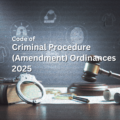The Constitution of the People’s Republic of Bangladesh (hereinafter, ‘the Constitution’) entrusts the president with the power to promulgate ordinance under Article 93. Among all the powers the president exercises under the authority of the Constitution, this is the most significant because by promulgating ordinance he exercises purely legislative power. Interestingly, the office of the president has been discussed in ‘Part IV: The Executive’ of the Constitution whereas the president’s ordinance making power has been discussed later in ‘Part V: The Legislature’ of the same. In the regular legislative process the president plays a very formal and limited role (by assenting to the Bill or by returning it to parliament with a message to reconsider his suggestions).1 But under Article 93 he exercises the entire legislative power on advice of the Prime Minister.2 However, while exercising such legislative power, whether the president can amend any provision of the Constitution has remained in ambiguity.
According to Article 93, the president can promulgate an ordinance when the ‘parliament stands dissolved’ or when the parliament ‘is not in session’ if he is satisfied that there exist circumstances which necessitate immediate action. However, the original provision, before amendment, envisioned the ordinance making power only when the Parliament was not in session.3 A plain reading of Article 93 shows that it is the president alone who is to be satisfied as to when such immediate action is needed. It has also been held in Ahsanullah v. Bangladesh4 that the satisfaction of the president regarding the existence of the circumstance requiring immediate action cannot be questioned in court.
Article 93 has imposed three limitations on the president’s ordinance making power. Firstly, an ordinance shall not make any provision which cannot be lawfully made by an ‘Act of Parliament’ under the Constitution. Secondly, an ordinance shall not make any provision for ‘altering’ or ‘repealing’ any provision of the Constitution (emphasis added). Thirdly, an ordinance cannot also be promulgated for continuing in force any provision of an ordinance made earlier.
The first limitation is clear and unambiguous in the sense that an ordinance shall not be inconsistent with any provision of the Constitution. This provision has ensured harmony between Article 93 and Article 7 of the Constitution. Because, ordinance falls within the definition of ‘law’ as given by Article 152 and ipso facto comes under the ambit of Article 7.5 The third one as enumerated in Article 93 is also clear as to the meaning.
The second limitation imposed by Article 93 in restricting the ordinance making power of the president is ambiguous for a few reasons.
Firstly, it does not strictly prohibit the promulgation of an ordinance to ‘amend’ any provision of the Constitution. Nowhere in Article 93 has it been provided that an ordinance shall not be promulgated with a view to ‘amending’ any provision of the Constitution. It only restricts to ‘altering’ or ‘repealing’ Constitutional provision by way of promulgating an ordinance.
In this regard, it is pertinent to mention that Article 142 (which deals with the amendment of the Constitution) has enumerated four methods to amend any provision of the Constitution: ‘addition’, ‘alteration’, ‘substitution’, and ‘repeal’. Apart from that, Article 7B (which restricts amendment of the basic provisions of the Constitution) introduces some other methods: ‘insertion’, ‘modification’, ‘substitution’, ‘repeal’, and ‘any other means’. Upon reading Article 142 and Article 7B together, we find many other constitutionally recognized modes of amendment apart from ‘alteration’ and ‘repeal’ which have not been brought under the limitation clause of Article 93. Thus, it triggers a question: whether the rest of the recognized methods of amending Constitutional provisions remain open to the president under Article 93.
Secondly, Article 142 provides that any constitutional provision may be amended by an ‘Act of Parliament’. According to section 3(1a) of the General Clauses Act, 1897, an ordinance is also an ‘Act of Parliament’. Moreover, Article 93 makes it clear that an ordinance promulgated by the president shall have the force of law like an ‘Act of Parliament’. Thus, it may be argued that an ordinance having the status of an ‘Act of Parliament’ is capable of amending any provision of the Constitution by way of the methods recognized by Article 142, except by ‘alteration’ and ‘repeal’ pursuant to Article 93.
Thirdly, amendment of any Constitutional provision by ‘addition’ functions distinctively than that of by ‘alteration’, ‘substitution’, and ‘repeal’ and as such it cannot be interpreted that the words ‘alteration’ and ‘repeal’ as enumerated in Article 93 include ‘addition’ also. Hence, it may be argued that the purpose of Article 93 is not to entirely restrict the president from amending any constitutional provision since the framers of the Constitution kept ‘addition’ aside from the restriction clause.
To resolve the said ambiguity, regard may be had to the intention of the legislature behind the incorporation of Article 93 in our Constitution. The members of the Constituent Assembly while incorporating Article 93 did not engage in any debate or elaborate on any discussion, rather unanimously accepted the same.6 Therefore, the intention of the framers of the Constitution remains unclear as to whether they intended to debar the president from amending any provision of the Constitution by any possible means. Conversely, incorporation of Article 93 in the Constitution testifies the positive approach of the legislature to allow the president to exercise legislative powers. From that perspective, it may be argued that since the members of the Constituent Assembly did not restrict all the methods of amendment in Article 93 and aimed to sanction legislative power to the president, they might have intended to allow him to amend any constitutional provision.
The ambiguity in Article 93 has far-reaching consequences. This may give the usurpers an opportunity to use Article 93 as a tool to intrude into the Constitution. If an amendment of any constitutional provision takes place under Article 93, it will lead to a serious constitutional crisis. Firstly, it will transgress the principle of supermajority as prescribed in Article 142 during amendment of any constitutional provision.7 Secondly, it will give extensive constitutional power to one man, which is undemocratic and contrary to constitutionalism. Thirdly, it will destroy the rigidity which is one of the salient features of our constitution.
In the backdrop of the above analysis, it is evident that there is ambiguity in Article 93 which can be abused to amend any constitutional provision. In order to prevent unconstitutional intrusion in future, the aforesaid ambiguity should be removed with an express constitutional provision. In this regard, the parliament should amend Article 93 and insert an express provision to the effect that no ordinance can amend any constitutional provision by any means.
References
- The Constitution of the People’s Republic of Bangladesh 1972, arts 80 and 142.
- The Constitution of the People’s Republic of Bangladesh 1972, art 48(3) says that the President shall act in accordance with the advice of the Prime Minister in the exercise of all his functions except the appointment of the Prime Minister and the Chief Justice.
- The Proclamation (Amendment) Order, 1977; The Constitution (Fifteenth Amendment) Act, 2011.
- (1992) 44 DLR 179.
- The Constitution of the People’s Republic of Bangladesh 1972, article 7(2) reads, ‘… if any other law is inconsistent with this Constitution that other law shall, to the extent of the inconsistency, be void’.
- Md. Abdul Halim (ed), Bangladesh Ganaparishad Bitarka (CCB Foundation 2014) 782.
- The Constitution of the People’s Republic of Bangladesh 1972, art 142 provides that an amendment Bill shall be passed by votes of not less than two-thirds of the total number of members of Parliament.
















No Comments
Leave a comment Cancel